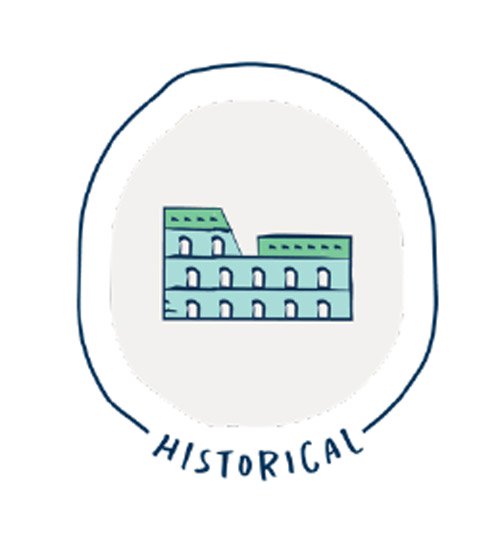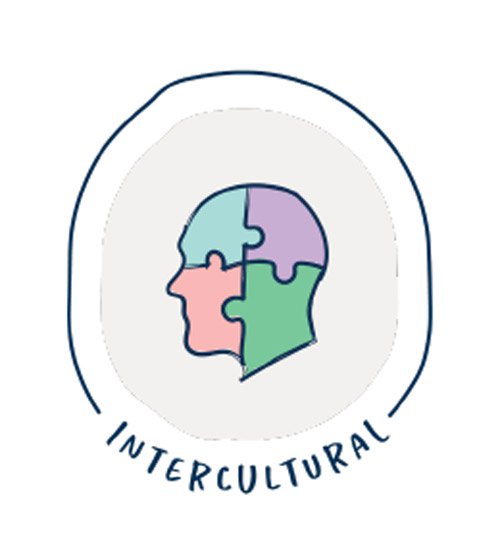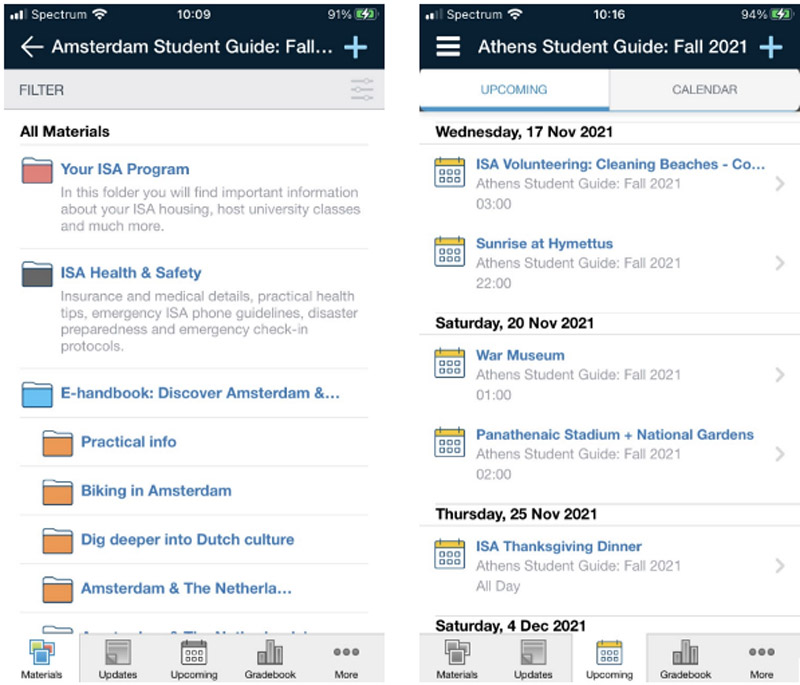-
Discovery Model
-
Bridging Cultures Orientation
-
Schoology
The Discovery Model
A primary objective of all ISA programs is to facilitate the learning and development of each student, regardless of background or prior preparation. At most study sites, we rely on host universities to provide quality instruction in the classroom, while ISA acts as the main facilitator of learning outside the classroom.
Since 2015, our efforts to promote this important type of learning call upon an educational framework we call The Discovery Model. This model organizes student learning and development into six areas of discovery: Intercultural, Historical, Sociopolitical, Professional, Environmental, and Sustainability.
Our resident staff uses the six discovery area icons to label co-curricular learning opportunities described on Schoology, our app-based Learning Management System (LMS). Throughout each program, we give participants numerous opportunities to pursue guided learning in these discovery areas through participation in ISA excursions, cultural activities, optional micro-credentials by WorldStrides, and community involvement.

Historical
ISA encourages our students to appreciate their host country's history, architecture, and unique cultural production, as these inform the collective memory of the host population. Historical discovery involves education in the rich history of art, architecture, language, music, theater, and dance. This discovery area translates to activities like architectural walking tours, live performances, museum visits, and guided tours of monuments such as the Alhambra, the Parthenon, the Uffizi Gallery, Volubilis, and Stonehenge.Examples of our efforts to help students pursue HISTORICAL discovery:
- Automatically enrolling all students in the Wayfinder micro-credential by WorldStrides, which emphasizes historical learning specific to the study site.
- Offering excursions to museums, archaeological sites, monuments, architectural marvels, famous homes, cultural icons, and UNESCO Heritage Sites, all with clearly defined learning objectives.
- Taking students to performances while providing context and history to help them better appreciate what they are seeing and hearing: for example, tango in Buenos Aires, traditional Irish music in Galway, flamenco in Spain, opera in Milan, or Hanja theater in South Korea.

Sociopolitical
ISA aims to ensure that students are well-informed about the sociopolitical realities of their program location, like the prevailing forms of government, the names of major public institutions, and the underpinnings of contemporary social movements and conflicts. Program participants intelligently discuss current events with staff, tour guides, and guest lecturers. By the program’s end, students should be able to articulate how these events impact host country nationals' views of domestic and U.S. government policies and be able to engage with non-U.S. media. Examples of our efforts to help students pursue SOCIOPOLITICAL discovery:- Classifying local and national media channels and newspapers to help students understand the political/ideological leanings of various channels from a local perspective.
- Directing students to useful news sources such as newsinitiative.google.com or newscrunch.com to facilitate the consumption of non-English-language news.
- Sending students links to selected news stories via Schoology and providing opportunities for live or asynchronous group discussions.
- Exploring the origins and historical circumstances surrounding political movements like Catalan independence, the European refugee crisis, France’s gilets jaunes, Brexit, or the status of Taiwan or Hong Kong in Chinese state policy.
- Offering excursions that are directly related to sociopolitical issues as part of our Wayfinder micro-credential by WorldStrides. For example, we travel to the Demilitarized Zone (DMZ) in South Korea, which has enormous geopolitical implications for trade, international security, and regional relations.

Intercultural
ISA aims to increase student intercultural competence in cross-cultural settings.Examples of our efforts to help students pursue INTERCULTURAL discovery:
- Classifying local and national media channels and newspapers to help students understand the political/ideological leanings of various channels from a local perspective.
- Encouraging students intrigued by the “What is Culture?” question during the Bridging Cultures Orientation to pursue WorldStrides’ Interculturalist micro-credential through various themed learning modules in Schoology.
- Sending students links to selected news stories via Schoology and providing opportunities for live or asynchronous group discussions.
- Providing students with specific advice to help them thrive in their host culture.
- Facilitating language tutoring for our students and arranging cultural/linguistic exchanges with locals.
- Arranging activities that promote cross-cultural exchange and allow our students to observe and participate in local culture. Possible activities include tapas nights in Spain, interactive farmer’s market tours, cooking classes, or opportunities to don traditional local dress in Morocco or South Korea.

Professional
ISA empowers students to use their time abroad to explore their professional and career goals. Students have access to the Professional Development Toolbox as a resource before departure and can opt into the Global Professional micro-credential during and after their program.Examples of our other efforts to help students pursue PROFESSIONAL discovery:
- Providing LMS modules that focus on practical aspects of the job hunt, including resume and cover letter writing tips, interview coaching, and advice on how to market international experience effectively.
- Hosting guest talks by established professionals, both ex-pats and foreign nationals, who have pursued international careers and currently reside or work in the host community.
- Encouraging students to set up LinkedIn accounts and to think about how to leverage international experience in the job market and the 'skills economy.’
- Asking students to set "SMART" goals and to look for ways they can strategically use their time abroad to influence future professional development and career ambitions.

Environmental
ISA provides opportunities for students to visit some of their host country’s incredible environmental wonders, as this gives students an appreciation of—and connection with—the natural ecology of the region in which they are living. We have found that developing an understanding of their local environment makes students feel more comfortable, safe, and healthy during their program.Examples of our efforts to help students pursue ENVIRONMENTAL discovery outside the classroom:
- Conducting wildlife tours in Addo Park or whale watching tours near Cape Town, South Africa.
- Visiting the Monteverde cloud forests of Costa Rica or Iguazu Falls in Misiones.
- Embarking on hiking day trips and overnight excursions in Granada’s Alpujarras or Peru’s Machu Picchu.
- Taking bicycle tours of the Netherlands’ rural windmills.

Sustainability
ISA’s newest discovery area focuses on behavioral outcomes such as making informed consumer and lifestyle choices, embracing an ethos of social responsibility, and upholding “one planet” ethics around shared resources. This discovery area allows ISA to leverage the strengths of our WorldStrides partner The Education Abroad Network (TEAN) and its longstanding Choose Earth certification program.Examples of SUSTAINABILITY co-curricular programming that is already underway:
- Hosting “Clean the Beach Day” or Community Service Day activities in conjunction with our Choose Earth micro-credential by WorldStrides.
- Touring a Costa Rican village where locals showcase their commitment to composting and demonstrate practices associated with the ‘Reject, Reduce, Reuse, Repair, Recycle’ government initiative.
- Offering students a gamified 30-day eco-challenge to encourage locally sourced consumption and carbon footprint reduction.
- Arranging a guest talk by a sustainable fishing expert in Busan, South Korea, that touches upon the impacts of ocean pollution, aquaculture, overfishing, and seafood farming.
Bridging Cultures Orientation
Upon arrival in their host country, all ISA students undergo a Bridging Cultures Orientation to familiarize them with their host community and prepare them to make the most of their time abroad. It is delivered to all students during the first week on-site and comprises a mix of practical tips, culture-general content, and country-specific information.
For several reasons, the first days after arrival offer some of the best opportunities to transmit information to participants effectively. We make the most of this time by giving our students tools they can use to approach learning abroad more intentionally. These include an app-based Learning Management System (LMS) called Schoology. Currently in use at all ISA sites, we curate this e-handbook of resources to help students adapt to the host culture and stay on top of upcoming calendar events.
In addition to robust information about money, transportation, housing, health and safety protocols, and risk mitigation, the Bridging Cultures Orientation also encompasses goal setting, tips for academic success abroad, and cohort-building icebreakers. With input from the U.S.-based Academic Affairs team, our teams abroad introduce students to some definitions of culture and frameworks for thinking about intercultural competence. These are tailored to reflect local program realities and draw upon resident staff areas of expertise.
During the Bridging Cultures Orientation, a Schoology calendar of on-site ISA activities is shared with students, highlighting upcoming co-curricular opportunities and important academic dates, along with ISA-led walking and bus tours programmed for the first week abroad. These tours aim to familiarize students with major landmarks, monuments, and public squares while demonstrating safe and efficient movement to and from host universities and popular neighborhoods, both on foot and via public transportation. We emphasize living, walking, and shopping as locals do, avoiding concentrated tourist areas.
Tours also include an introduction to the culture and history of the city designed to help students review and recall the information that they initially learned in their pre-departure online orientation. Additional cultural activities offered later in the program, along with tours of lesser-known areas of the city, deepen and expand on topics covered during orientation by incorporating learning objectives associated with The Discovery Model.
We are committed to providing an equitable learning environment for all students regardless of background. The WorldStrides DEI Council works closely with all ISA on-site staff to create country-specific resources to support students with diverse identities who may need to navigate special challenges abroad. Like those mentioned above, these resources are foregrounded during the Bridging Cultures Orientation and are available on Schoology throughout the program.
What is Schoology?
Since 2015, ISA has used Schoology to meet digital natives where they are. Schoology is an app-based Learning Management System (LMS) that allows our resident teams abroad to maintain a digital learning environment tailored to today’s independent, tech-savvy student.
How do students interact with Schoology abroad?
Two weeks before arriving at the study site, each ISA student is welcomed to a site-specific Schoology Student Guide full of tips, resources, and itineraries for each ISA-led event.
In addition, students can use Schoology to access…
- Themed learning modules to earn micro-credentials that connect their study abroad experience to their career goals.
- A program calendar with important dates for the Bridging Cultures Orientation, cultural activities and excursions, and other events happening throughout the city.
- Activities, restaurants, and attractions hand-picked and fully recommended by our local experts.
- Transportation guides and tips, complete with preset directions to navigate to planned events.
- Updates and safety check-ins directly from our team via the messaging feature.
- Links to relevant news stories and media, plus other cultural, academic, and personal resources.

Why we use Schoology with our students abroad
Schoology dynamizes The Discovery Model by allowing our teams abroad to connect all cultural events, activities, and other learning opportunities with one or more of ISA’s discovery areas. This way, students with specific interests can easily tailor their experiential learning to co-curricular, themed areas of focus. For example, an environmental studies major who wants to concentrate on climate stewardship can opt for programming associated with the Sustainability or Environmental areas of discovery.

